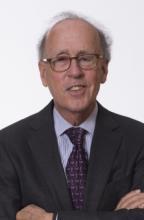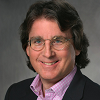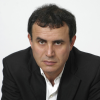God and Morality: Asking the Wrong Question
Frans de Waal's new book The Bonobo and the Atheist asks a question that vexed Greek sages thousands of years ago and every philosopher since: are we moral because we believe in god, or do we believe in god because we are moral? Cutting to the chase, his answer is a resounding 'yes' to the latter.
Ah, the benefits of having a good publicist. De Waal, whom I have admired for years, has found a real pro, because his latest book probing this age-old question has received much press lately in print, radio and television, even though he breaks no new ground. I am delighted that he has found this audience because his message, while not new, is vitally important.
However, while de Waal gets the attention, I would like to suggest that his question about morality and god is not quite right. The question as posed implies that morality, even if derived from our biology and without any reference to religion, will lead to a belief in god. He is almost right. But Captain Edward Smith almost missed the iceberg. Even a small mistake can be catastrophic, and de Waal's error in linking morality to god, even while inverting the usual relationship, is a fatal flaw in his thesis.
Five Pillars
From his writings, de Waal clearly believes that religion retains some purpose in modern society, mainly in the form of strengthening community and providing the comfort of ritual. Again, he is almost right. As I argued in Beyond Cosmic Dice, religion pathologically persists in service of five different masters of human weakness: fear of death and the promise of seeing lost loved ones; the need to explain away the unknown; hope for controlling one's destiny; a desire for social cohesion; and the corrupting allure of political power. So we create, each of us, and collectively, a god who is all-powerful and all-knowing to address some combination of these five masters, or all of them. Holding on to two of the five is where de Waal goes astray.
There is no link between morality and the five pillars; nothing about being moral would lead to a belief in god. The two concepts do not intersect. The history of religion proves the point.
That morality does not derive from, or lead to, religion has been the conclusion of some of humanity's greatest minds, including David Hume, the father of religious studies. Due to certain inconveniences, like the possibility of being burned alive at the stake, Hume restricted his writings to polytheism. But it takes no great leap to read between the lines and apply his words to monotheism and Christianity in particular. Hume did not believe morality is a gift from god because he thought religion a false construct and therefore no foundation for human behavior or thought. Instead, humanity's first beliefs in a higher power were borne of ignorance and fear of the natural world: every disaster that befalls us demands an explanation. Naturally, multiple unknown causes leads to the idea of multiple powers; polytheism is the natural state of a primitive mind.
We hang in perpetual suspense between life and death, health and sickness, plenty and want; which are distributed amongst the human species by secret and unknown causes, whose operation is oft unexpected, and always unaccountable. These unknown causes, then, become the constant object of our hope and fear.
From Many, One
But so too does this apply to belief in one god; one is just a derivative of many. The idea of powerful gods, or a god, controlling each important aspect of our lives would not by itself be satisfying. We want to put a face to the power; we want to be familiar with the deities that control our fate; we want to know them so that we can communicate with them and solicit their interventions. We are all Dorothy in the Wizard of Oz, seeking to reveal the nature of the man behind the curtain, hoping to strike up a conversation with whoever is in charge.
By no coincidence then do our gods take on idealized human form. Our egoistic species has a universal tendency to transfer human-like qualities to surrounding objects, giving them characteristics that are familiar to us. This tendency to anthropomorphize everything around us has the consequence that we attribute human malice or benevolence to inanimate objects, and of course to the gods above. With their human form, gods also take on human personalities, with passions and weaknesses that make them jealous, vengeful, spiteful, fickle, wicked and foolish. How comforting to know that one's fate and fortune, tossed about by unknown causes, can be controlled by dialogue with an invisible power that possesses familiar sentiments and intelligence!
But attributing human qualities to a higher power has a paradoxical consequence, one leading inevitably to the idea of multiple gods, at least initially. We raise our own estimation of ourselves as god-like, but diminish the power of the very gods we create by humanizing them. Once again, Hume is right on the money:
They suppose their deities, however potent and invisible, to be nothing but a species of human creatures, perhaps raised from among mankind, and retaining all human passions and appetites, together with corporeal limbs and organs. Such limited beings, though masters of human fate, being, each of them, incapable of extending his influence everywhere, must be vastly multiplied, in order to answer the variety of events, which happen over the whole face of nature. Thus every place is stored with a crowd of local deities; and thus polytheism has prevailed.
The idea that deities are "nothing but a species of human creatures, perhaps raised from among mankind" of course applies to more than the old discarded gods of the past. The words exactly describe Jesus. The link between the one god of today and the many of the past is forged in steel. The characteristics that originated in polytheism continued to apply even as the number of gods diminished. One could argue, in fact, that today's religions are not truly monotheistic. Christianity has created hundreds of objects of worship in the guise of saints, who have become minor gods to many followers. So this conclusion from Hume is particularly poignant:
... it will appear, that the gods of all polytheists are not better than the elves or fairies of our ancestors, and merit as little any pious worship or veneration. These pretended religionists are really a kind of superstitious atheists, and acknowledge no being, that corresponds to our idea of deity.
So we conclude that most of the multiple divinities of the ancient world were supposed to have been human or human-like, thereby diminishing their power. Yet Christianity is no different: we have Jesus, in the flesh, bleeding like a regular guy, no different from what Hume disparages in his idea of a cruder polytheistic god. Like many gods, one god is nothing better than the elves or fairies of our ancestors. Nowhere in this narrative is there any suggestion that morality is linked to religion, or that morality elsewhere derived would lead to a belief in god.
While I emphasize David Hume as the father of religious studies, we cannot neglect to mention its grandfather, Baruch de Spinoza, who preceded Hume by almost 100 years. When Spinoza took on the question of ethics he created a path to secular enlightenment that Hume did not fully assimilate. I raise this here because at no point in Spinoza's masterpiece, Tractatus Theologico-Politicus did he ever link the development of human morality with a future belief in god. As did Hume later, Spinoza concluded that the history of religion precludes any connection at all between morality and religion, in any order.
Poseidon and Morality
Religion's history begs an important question: why of all the gods does the god of Abraham own the right to morality? The history of religion can be understood as the winnowing of gods from many to one. What this means is that all of us are atheists, even the most devout, undoubting, dedicated priest, rabbi or mullah. Atheist means "without god," and all of us are without at least some gods. All monotheistic believers reject all gods, except one. They reject all the Greek elder gods Cronus, Gaea, Uranus, Rhea, Oceanus, Tethys, Hyperion, Mnemosyne, Themis, Iapetus, Coeus, Crius, Phoebe, Thea, Prometheus, Epimetheus, Atlas, Metis, and Dione. Muslims, Jews and Christians all deny the existence of the Greek Olympic gods Zeus, Poseidon, Hades, Hestia, Hera, Ares, Athena, Apollo, Aphrodite, Hermes, Artemis, and Hephaestus. All major religions today dismiss as nothing but myth the Roman gods Jupiter, Juno, Neptune, Pluto, Apollo, Diana, Mars, Venus, Cupid, Mercury, Minerva, Ceres, Proserpine, Vulcan, Bacchus, Saturn, Vesta, Janus, Uranus and Maia. Yet this roster of gods was real to multiple thousands of people for thousands of years, every bit as real as the one god worshipped by Christians, Muslims and Jews today. Was the morality derived from a belief in those gods any different from what we see today with one? If asked, Christians, Jews and Muslims today would use numerous and diverse reasons to deny the existence of Greek and Roman gods, who were so important to so many people for so long. I simply extend that reasoning to include the one remaining god. Everybody rejects as silly the idea of gods; I merely exclude the existence of one more god than those who consider themselves religious.
Something that we all reject is hardly a sound basis for morality. A more compelling basis would be the Tooth Fairy. Hear me out. No adult takes the myth seriously, of course. Yet the evidence for the existence of the Tooth Fairy is in fact more compelling than that for any other belief system. As a child, you put your recently yanked tooth under your pillow. The next morning, lo and behold, you have a quarter where the tooth used to be. That is concrete, real, undeniable evidence that the Tooth Fairy came to visit during the night. What other explanation could be possible with such incontrovertible evidence? What could be more compelling: you can hold that quarter in your hand, and you know for a fact that the previous night only a tooth lay beneath your head. The Tooth Fairy exists, end of story. Now, science might try to convince you, as a five-year-old, that there indeed is a more rational explanation for the nocturnal switch, such as a caring parent acting the part, for example, but you will have none of it. You believe the Tooth Fairy exists, have evidence to support your belief, and dismiss the scientific explanation as heretical.
Fortunately, we all grow out of believing in the Tooth Fairy. Well, no, we don't. We just transfer that belief to something we call "god." God is the Tooth Fairy, and the Tooth Fairy is god. Instead of looking for a quarter under our bed, we look to miracles as evidence to support our belief, ignoring the fact that belief cannot be supported by evidence. Yet, we insist. We see statues of the Virgin Mary crying blood, or the face of Jesus on an eggplant, or witness a healer laying hands giving ambulation to the disabled. Instead of the story involving a tooth and quarter, our narrative becomes more complex (we are adults after all), with the plot thickening to include creation and an afterlife. But both stories are made up, figments of our imagination, equally supported by "evidence." Both are valid only because we believe. The first impulse would be to dismiss as completely absurd any equality between god and the Tooth Fairy. But resist the temptation, and ask yourself a simple question: how do the two really differ? Whatever argument you come up with to support a belief in god, can you not also apply to the Tooth Fairy, or Santa Claus, or trolls under a bridge in Ireland? Yes, of course, the concept that the Tooth Fairy is real is lunacy. But so, too, the belief in god. The notion that god exists is as childish and as silly as the belief that a mythical creature enters your bedroom at night to give alms for your milk teeth. This is a poor foundation for human morality.
Morality and Biology
Fortunately, we can understand the basis for morality without invoking god either as a cause or a consequence. There is no compelling evidence that morals are derived from religion, nor god's grant of free will. Instead evidence points to morals arising from inherent characteristics embedded in human nature as a consequence of our sociality. What we view as moral behaviors -- kindness, reciprocity, honesty, respect for others -- are social norms that evolved in the context of a highly social animal living in large groups. The evolution of these social norms enabled a feeble creature to overcome physical limitations through effective cooperation. Morality is a biological necessity and a consequence of human development. Morality is our biological destiny, deeply embedded in the human psyche. Our moral characteristics are primeval adaptations that helped our ancestors survive. In a world of dangerous predators, early man could thrive only through mutual cooperation: good (moral) behavior strengthened the tribal bonds that were essential to survival. What we now call morality is really a suite of behaviors favored by natural selection in an animal weak alone but strong in numbers. Religion has nothing to do with morality: our understanding of human history, and the development of religion over the ages provides compelling evidence that morality is not derived from religion, nor leads to a belief in god.
Book Introduction:
Beyond Cosmic Dice: Moral Life in a Random World
by Jeff Schweitzer and Giuseppe Notarbartolo di Sciara
Jeff Schweitzer spent much of his youth underwater pursuing his lifelong fascination with marine life. He obtained his doctorate from Scripps Institution of Oceanography through his neurobehavioral studies of sharks and rays. He has published in an eclectic range of fields, including neurobiology, marine science, international development, environmental protection and aviation. Jeff and his wife live in central Texas, moving there after retiring from the White House as Assistant Director for International Science and Technology.
Giuseppe Notarbartolo di Sciara is an evolutionary biologist with a doctorate from the University of California. He serves as a marine policy advisor to various national and international bodies, and has recently represented Italy in multilateral environmental negotiations. Through appearances on television and radio, and the publication of articles and books, he has been striving to increase public awareness of marine conservation. Giuseppe lives with his family in Northern Italy.
This article is brought to you by the author who owns the copyright to the text.
Should you want to support the author’s creative work you can use the PayPal “Donate” button below.
Your donation is a transaction between you and the author. The proceeds go directly to the author’s PayPal account in full less PayPal’s commission.
Facts & Arts neither receives information about you, nor of your donation, nor does Facts & Arts receive a commission.
Facts & Arts does not pay the author, nor takes paid by the author, for the posting of the author's material on Facts & Arts. Facts & Arts finances its operations by selling advertising space.



















